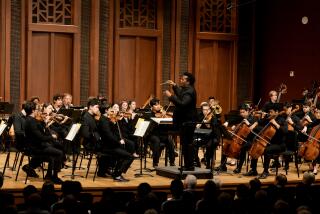MUSIC REVIEW : Masterful Concert by Janos Starker
- Share via
LA JOLLA — Janos Starker might be described as the Zen master of the cello. The Hungarian-born cellist’s austere demeanor and purity of musical line reveal a performer who has pared down his art to its absolute essentials. No grand gestures, angst-laden sighs or rapturous glances--just utter concentration and a consummately refined technique.
In his taut, unhackneyed program Saturday night at Sherwood Auditorium, Starker asserted his customary authority. He opened with an intimate account of Robert Schumann’s “Phantasiestucke,” Op. 73, followed by a refined, seamless traversal of Brahms’ D Major Cello Sonata, Op. 78. The felicities of Starker’s sophisticated approach, however, were lost on a minority of his La Jolla audience. Although he started out with a full house, as well as several rows of listeners on the Sherwood stage, a noticeable number of seats turned up empty after intermission. But after half a century of performing--Starker is 66--a fickle audience is unlikely to mar either his poise or his commitment.
In fact, Starker saved his most memorable offerings for the program’s second half. At the request of Neale Perl, executive director of the sponsoring La Jolla Chamber Music Society, Starker played Gaspar Cassado’s Suite for Unaccompanied Cello. Cassado was a Spanish cello virtuoso who wrote almost exclusively for his own instrument, and the dance suite is one of those showpieces which only cellists know. In Starker’s able hands, the cello imitated a veritable consort of instruments: guitar, violin, and various members of the percussion family. Although the inspiration of Cassado’s music is decidedly folkloric, the performer’s approach could not have been more urbane and polished.
Starker reveled in the dense, furious neoclassicism of Bohuslav Martinu’s Second Cello Sonata, a little-known work he recently recorded. To complement its serious counterpoint and lofty, chorale-like slow movement, Starker ended the program with Martinu’s witty, almost slapstick, “Variations on a Theme of Rossini.”
Pianist Shigeo Neriki, one of Starker’s regular collaborators, accompanied with decidedly mixed results. His strong hands and logical mind proved ideal for the Martinu Second Sonata, but his approach to the Schumann and Brahms seamed overly calculated and mechanical. In these works he could not have been further from the soloist’s natural, unaffected expression.
More to Read
The biggest entertainment stories
Get our big stories about Hollywood, film, television, music, arts, culture and more right in your inbox as soon as they publish.
You may occasionally receive promotional content from the Los Angeles Times.










